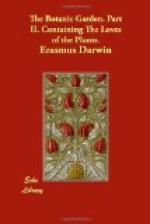Inlays
the broider’d weft with flowery dyes,
70 Quick beat the reeds, the pedals fall and rise;
Slow
from the beam the lengths of warp unwind,
And
dance and nod the massy weights behind.—
Taught
by her labours, from the fertile soil
Immortal
Isis clothed the banks of Nile;
75 And fair ARACHNE with her rival loom
Found
undeserved a melancholy doom.—
Five
Sister-nymphs with dewy fingers twine
The
beamy flax, and stretch the fibre-line;
Quick
eddying threads from rapid spindles reel,
80 Or whirl with beaten foot the dizzy wheel.
—Charm’d
round the busy Fair five shepherds press,
Praise
the nice texture of their snowy dress,
Admire
the Artists, and the art approve,
And
tell with honey’d words the tale of love.
85 So now, where Derwent rolls his dusky floods
Through
vaulted mountains, and a night of woods,
The
Nymph, GOSSYPIA, treads the velvet sod,
And
warms with rosy smiles the watery God;
His
ponderous oars to slender spindles turns,
90 And pours o’er massy wheels his foamy
urns;
With
playful charms her hoary lover wins,
And
wields his trident,—while the Monarch spins.
—First
with nice eye emerging Naiads cull
From
leathery pods the vegetable wool;
[Gossypia. l. 87. Gossypium. The cotton plant. On the river Derwent near Matlock in Derbyshire, Sir RICHARD ARKWRIGHT has created his curious and magnificent machinery for spinning cotton; which had been in vain attempted by many ingenious artists before him. The cotton-wool is first picked from the pods and seeds by women. It is then carded by cylindrical cards, which move against each other, with different velocities. It is taken from these by an iron-hand or comb, which has a motion similar to that of scratching, and takes the wool off the cards longitudinally in respect to the fibres or staple, producing a continued line loosely cohering, called the Rove or Roving. This Rove, yet very loosely twisted, is then received or drawn into a whirling canister, and is rolled by the centrifugal force in spiral lines within it; being yet too tender for the spindle. It is then passed between two pairs of rollers; the second pair moving faster than the first elongate the thread with greater equality than can be done by the hand; and is then twisted on spoles or bobbins.




